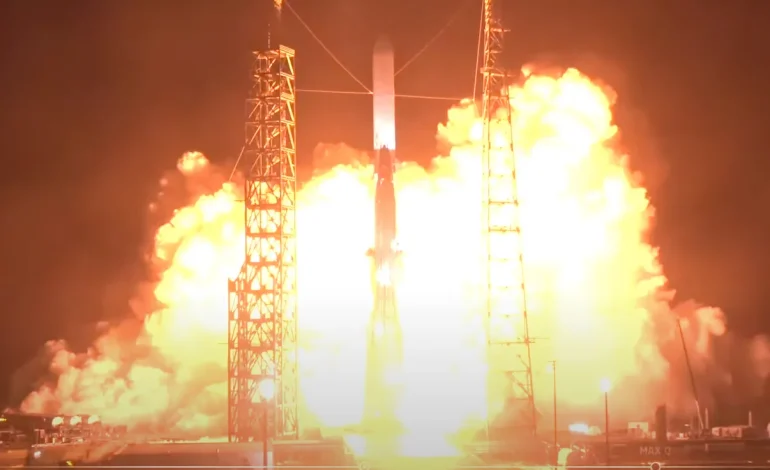Blue Origin’s New Glenn Rocket Reaches Orbit in Milestone Flight, Falls Short on Booster Landing

Blue Origin, the space venture backed by Jeff Bezos, achieved a significant milestone early Thursday morning with the successful orbital launch of its flagship New Glenn rocket, Bloomberg reports.
The launch, which took place at 2:03 a.m. local time from Cape Canaveral, marks a crucial step in the company’s efforts to challenge SpaceX’s dominance in the launch market.
The New Glenn rocket successfully deployed its Blue Ring Pathfinder test satellite into orbit, fulfilling the primary objective of the mission. Following liftoff, the rocket’s lower booster stage separated as planned from the upper stage, which continued its journey to space. Approximately 13 minutes into the flight, Blue Origin confirmed that the upper stage had successfully reached orbit, sparking cheers within mission control.
However, the booster portion of the rocket was destroyed during its attempt to land on a barge in the Atlantic Ocean, failing to achieve the secondary goal of a successful recovery.
“Key here, we hit our main objective,” Blue Origin executive Ariane Cornell said to viewers. “We got to orbit, safely.”
This long-awaited flight serves as a demonstration of Blue Origin’s ability to execute its ambitious space exploration plans, a feat that has eluded the company for years. The New Glenn rocket, a towering presence second only to the Saturn V rocket, is critical to fulfilling a $10 billion backlog of launch contracts with commercial customers, NASA, and the US Defense Department. It is also intended to launch variations of Blue Origin’s lunar landing vehicles and is a key component of NASA’s Artemis program, which aims to return humans to the Moon.
While Blue Origin has previously conducted suborbital flights carrying paying tourists, this mission was its first to achieve orbit, a capability long dominated by Elon Musk’s SpaceX. SpaceX’s Falcon 9 rocket has become the most prolific orbital vehicle globally, and the company is now developing the Starship, a massive reusable rocket poised to further disrupt the launch market.
The launch saw Jeff Bezos, sitting alongside CEO Dave Limp in mission control, watching intently as the rocket ascended. Despite the missed booster landing, the mission places Blue Origin firmly within an elite group of US ventures capable of launching satellites into orbit. The company now aims to establish itself as a viable competitor to SpaceX.
Musk himself congratulated Bezos on the successful orbital launch via social media. Blue Origin is aiming for six to eight New Glenn launches in 2025, with the first mission potentially as early as the spring. While the cost of a New Glenn launch was not disclosed, CEO Limp stated that it would be “competitive” with current offerings. Bezos has also indicated that he believes the space industry has room for “multiple winners.”
The New Glenn program, formally announced in 2016, has faced multiple delays, particularly in the development of its BE-4 engines, although these engines are now powering the United Launch Alliance’s Vulcan rocket. In contrast to SpaceX’s approach of frequent testing and iterative improvements, Blue Origin has adhered to a more traditional engineering process with extensive behind-the-scenes development aimed at avoiding unplanned failures.
Recovering the booster on the first attempt was always considered a long shot. SpaceX, for example, took multiple attempts to perfect its booster landing technology, now a routine maneuver for its Falcon rockets.
Thursday’s mission is one of several required for Blue Origin to receive certification from the US Defense Department to launch sensitive national security satellites. Despite the program’s development setbacks, Blue Origin has secured substantial commercial contracts with companies like Telesat, AST Space Mobile, and Amazon.
Analysts say Blue Origin has priced its contracts competitively with SpaceX, while al so offering unique capabilities, including a higher mass-to-orbit capacity than the Falcon 9. Despite the ongoing development of SpaceX’s Starship, which could surpass New Glenn’s capabilities, analysts believe there will still be significant demand for New Glenn as an alternative launch provider.








